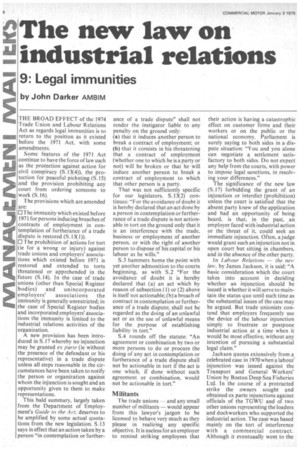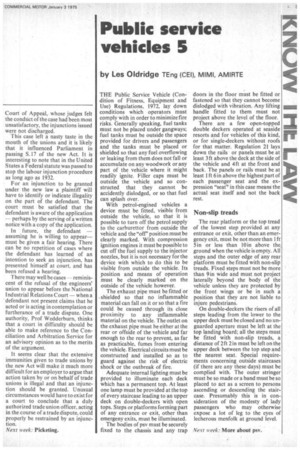The new law on industrial relations
Page 38

Page 39

If you've noticed an error in this article please click here to report it so we can fix it.
9: Legal immunities
by John Darker AMBIM THE BROAD EFFECT of the 1974 Trade Union and Labour Relations Act as regards legal immunities is to return to the position as it existed before the 1971 Act, with some amendments.
Some features of the 1971 Act continue to have the force of law such as the protection against action for civil conspiracy (S.13(4)), the protection for peaceful picketing (S.15) and the provision prohibiting any court from ordering someone to work (S.16).
The provisions which are amended are: 0 The immunity which existed before 1971 for persons inducing breaches of contracts of employment in contemplation of furtherance of a trade dispute is restored (S. 13( I)).
0 The prohibition of actions for tort (ie for a wrong or injury) against trade unions and employers' associations which existed before 1971 is restored and extended to torts threatened or apprehended in the future (S.14). In the case of trade unions (other than Special Register bodies) and unincorporated employers' associations the immunity is generally unrestricted; in the case of Special Register bodies and incorporated employers' associations the immunity is limited to the industrial relations activities of the organization.
A new provision has been introduced in S.17 whereby no injunction may be granted ex parte (ie without the presence of the defendant or his representative) in a trade dispute unless all steps reasonable in the circumstances have been taken to notify the person or organization against whom the injunction is sought and an opportunity given to them to make representations.
This bald summary, largely taken from the Department of Employments Guide to the Act, deserves to be amplified by some actual quotations from the new legislation. S.13 says in effect that an action taken by a person "in contemplation or further ance of a trade dispute" shall not render the instigator liable to any penalty on the ground only: (a) that it induces another person to break a contract of employment; or (b) that it consists in his threatening that a contract of employment (whether one to which he is a party or not) will be broken or that he will induce another person to break a contract of employment to which that other person is a party.
That was not sufficiently specific for our legislators. S. 13(2) continues: For the avoidance of doubt it is hereby declared that an act done by a person in contemplation or furtherranee of a trade dispute is not actionable in tort on the ground only that it is an interference with the trade, business or employment of another person, or with the right of another person to dispose of his capital or his labour as he wills."
S.3 hammers home the point with yet another admonition to the courts beginning, as with S.2 "For the avoidance of doubt it is hereby declared that (a) an act which by reason of subsection (1) or (2) above is itself not actionable; (b) a breach of contract in contemplation or furtherance of a trade dispute; shall not be regarded as the doing of an unlawful act or as the use of unlawful means for the purpose of establishing liability in tort."
S.4 rounds off the statute: "An agreement or combination by two or more persons to do or procure the doing of any act in contemplation or furtherance of a trade dispute shall not be actionable in tort if the act is one which, if done without such agreement or combination, would -not be actionable in tort."
Militants
The trade unions — and any small number of militants — would appear from this lawyer's jargon to be licensed to behave very much as they please in realizing any specific objective. It is useless for an employer to remind striking employees that their action is having a catastrophic effect on customer firms and their workers or on the public or the national economy. Parliament is surely saying to both sides in a dispute situation: "You and you alone can negotiate a settlement satisfactory to both sides. Do not expect any help from the courts, with power to impose legal sanctions, in resolving your differences."
The significance of the new Jaw (S.17) forbidding the grant of an injunction or interdict (prohibition) unless the court is satisfied that the absent party knew of the application and had an opportunity of being heard, is that, in the past, an employer faced with industrial action or the threat of it, could seek an immediate injunction. Often, a judge would grant such an injunction not in open court but sitting in chambers, and in the absence of the other party.
In Labour Relations — the new taw, by James Jackson, it is said: "A basic consideration which the court takes into account in deciding whether an injunction should be issued is whether it will serve to maintain the status quo until such time as the substantial issues of the case may be argued. But trade unionists contend that employers frequently use the device of the labour injunction simply to frustrate or postpone industrial action at a time when it would be most effective, without any intention of pursuing a substantial legal claim."
Jackson quotes extensively from a celebrated case in 1970 when a labourinjunction was issued against the Transport and General Workers' Union by Boston Deep Sea Fisheries Ltd. In the course of a protracted strike the owners sought and obtained ex parte injunctions against officials of the TGWU and of two other unions representing the loaders and dockworkers who supported the industrial action. The case was based mainly on the tort of interference with a commercial contract. Although it eventuaally went to the Court of Appeal, whose judges felt the conduct of the case had been most unsatisfactory, the injunctions issued were not discharged.
This case left a nasty taste in the mouth of the unions and it is likely that it influenced Parliament in passing S.17 of the new Act. It is interesting to note that in the United States a Federal statute was passed to stop the labour injunction procedure as long ago as 1932.
For an injunction to be granted under the new law a plaintiff will have to identify or indicate illegality on the part of the defendant. The court must be satisfied that the defendant is aware of the application perhaps by the serving of a written notice with a copy of the application.
In future, the defendant — assuming he is willing to appear— must be given a fair hearing. There can be no repetition of cases where the defendant has learned of an intention to seek an injunction, has presented himself at court, and has been refused a hearing.
There may well be cases — reminiscent of the refusal of the engineers' union to appear before the National Industrial Relations Court — when a ' defendant not present claims that he acted or is acting in contemplation or furtherance of a trade dispute: One authority, Prof Wedderburn, thinks that a court in difficulty should be able to make reference to the Conciliation and Arbitration Service for an advisory opinion as to the merits of the argument.
It seems clear that the extensive immunities given to trade unions by the new Act will make it much more difficult for an employer to argue that action taken by or on behalf of trade unions is illegal and that an injunction should be granted. Unusual circumstances would have to exist for a court to conclude that a duly authorized trade union officer, acting in the course of a trade dispute, could properly be restrained by an injunction.
Next week: Picketing.












































































